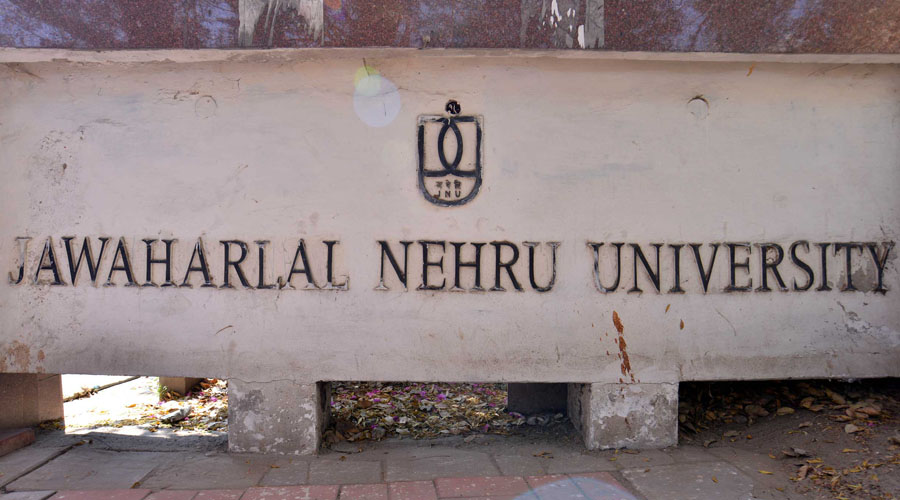When some teachers of Jawaharlal Nehru University(JNU) were listing before reporters on Monday the “unique feats” achieved under the watch of vice-chancellor M. Jagadesh Kumar, they realised another rare “achievement” had just been accomplished.
For the first time since its inception 52 years ago, the university failed to pay the February salary to teachers and staff on time, said Bikramaditya Choudhary, a faculty member at the Centre for the Study of Regional Development in JNU.
“The vice-chancellor failed to pay the salary of teachers and staff on time. How will the non-teaching staff who plan their expenditure on the monthly salary manage?” asked Choudhary.
The university pays salary on the last working day of every month, except for that in March. The March salary gets delayed because of taxation issues, said Choudhary, the former secretary of the Jawaharlal Nehru University Teachers’ Association (JNUTA). Choudhary said there had been several rulings by courts on the payment of salary on time.
Last week, in a case of the Andhra Pradesh government defaulting on salary to staff in March and April 2020, a bench of the Supreme Court iterated that “salaries are rightful entitlement of employees” and in case of delay, interest should be paid.
Some of the prominent charges levelled by the JNUTA against vice-chancellor Kumar are “arbitrary” academic and administrative decisions; spending public funds on litigation, most of which are avoidable; wastage of research seats; non-implementation of the reservation policy in faculty posts; and cutting expenses on academic matters.
The JNUTA said statutory bodies such as the Executive Council and the Academic Council and the Board of Studies were responsible for chalking out the academic calendar, deliberating upon new teaching programmes and finalising courses and selection committee panels.
“The irony is that all these bodies continue to be there, but they function in a sub-optimal manner — important decisions related to the university have been taken without substantial deliberations in these statutory bodies. It’s the VC and not the university that has autonomy in JNU today,” the JNUTA said.
Over 150 cases have been filed by various constituencies —faculty, students, non-teaching staff — against the vice-chancellor and his administration between 2016 and2021.
In the majority of the cases, the university has been found to commit illegality, it said.
For instance, on the matter of implementation of reservation in faculty positions in JNU, a division bench of Delhi High Court on January 11 this year had issued an order asking the varsity to recast the roster policy on all faculty posts. The bench modified an earlier order of a single judge which had quashed the advertisement for two faculty posts whose reservation status were altered.
One of the petitioners, Pradeep Shinde, an assistant professor at the centre for informal sector and labour studies, could not apply as the university changed the reservation status of the posts of associate professor in labour studies from the Scheduled Caste to the Scheduled Tribe in 2019. Shinde belongs to a Scheduled Caste.
The universities follow a roster system, according to which the fourth post is reserved for Other Backward Classes (OBCs) while the seventh and 13th posts are reserved for SC and ST applicants, respectively.
Although the single bench quashed the advertisement, the petitioner had gone to the division bench with the plea that the reservation policy be followed for all posts. The petitioner contended that around 30 posts meant for SCs and STs under the roster system were altered.
The division bench directed the varsity to implement the roster system, and upload the posts and their reservation status on the JNU website, after which it can start the process of fresh recruitment.
According to the financial accounts presented by the university, legal expenses increased from Rs 2.72 lakh in 2017-18 to Rs 17.7 lakh in 2018-19.
Additional funds of Rs 30 lakh were approved by the Executive Council in September 2020, despite opposition from the elected teachers’ representatives.
JNUTA secretary Moushumi Basu said most of the cases relate to targeted actions like chargesheet against teachers for taking part in protests, withholding of pension dues, denial of grant of leave, appointment of junior person as chairperson of centres or setting up of enquiry.
One such case is the appointment of chairpersons of centres. Delhi High Court passed an order in April 2018 to reinstate a dean and four chairpersons who were removed by the vice-chancellor for not agreeing to a decision to impose mandatory attendance for students. In another case, the vice-chancellor had debarred two members of the Executive Council from participating in the meeting.
The high court in April 2019 stated that prima facie “the resolution debarring them from participating in the meeting of the Executive Council is contrary to the statutes”.
Former JNUTA secretary Surajit Mazumdar said the university in 2017 reduced the number of seats in research programmes after wrongly interpreting the University Grants Commission’s guidelines on admission. A bench of Delhi High Court ruled thatthe university wasted several hundred seats.
“During theperiod of the last five years, the university discontinued the deprivation points given to students from backward areas,” he said.
The JNUTA demanded that Kumar be removed from the post immediately and should not be appointed in any other public institution as its head.
Separate emails were sent to Kumar and also to the education ministry by this newspaper. No comments could be obtained till Monday night.










